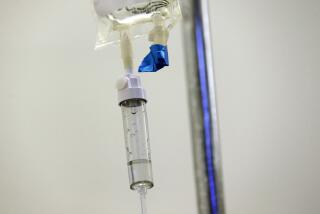Sanctions on Yugoslavia Hit Home : Trade: Costa Mesa’s SPI Pharmaceuticals, a major drug supplier to the region, seeks exemption to embargo.
- Share via
COSTA MESA — International economic sanctions against Yugoslavia that have sent ripples through the boardrooms of some U.S. companies doing business in that war-torn country are causing a tidal wave in the executive suites of SPI Pharmaceuticals Inc., which has a major operation there.
SPI, a subsidiary of ICN Pharmaceuticals Inc. in Costa Mesa, supplies about 50% of the medicines and other pharmaceuticals used in Serbia, Montenegro and Bosnia-Herzegovina, said John D. Scanlan, vice chairman of ICN Galenika’s management board and a former U.S. ambassador to Yugoslavia. It does so through a joint-venture company, ICN Galenika.
In addition, he said, the joint-venture company, 75% of which is owned by SPI and 25% by state-controlled Galenika Holdings, is Yugoslavia’s only producer of penicillin and penicillin-based medicine; insulin for use by diabetics; and some bandage-type products.
Besides selling those products in Yugoslavia, ICN Galenika makes insulin and antibiotics under a licensing agreement with two major U.S. drug companies: Eli Lilly and Co. of Indianapolis and Bristol-Myers Squibb Co. of New York, Scanlan said. Those two companies, which then sell the pharmaceuticals in Yugoslavia as their own brands, are also the biggest suppliers of raw materials to the joint-venture company, he said.
The sanctions, imposed by the United Nations on May 30, mean that much-needed medical supplies will not be available in the ethnically divided country once existing stocks are exhausted.
“Obviously, we will adhere to the sanctions, but we hope that the people who have to interpret the executive order will recognize the potential humanitarian problem that could result if we are unable to import the raw materials for the medicine produced by ICN Galenika, which, after all, is 75% American-owned,” Scanlan said.
“We have a very important role here. If we are unable to stay in business, there very soon would be a 50% deficit in medicines and pharmaceutical supplies to an area of Yugoslavia inhabited by at least 12 million people.”
Fritz Frommeyer, an Eli Lilly spokesman, confirmed that ICN Galenika is under license to make several pharmaceutical products, including antibiotics and insulin, for his company. Bristol-Myers officials could not be reached for comment.
About 75% of ICN Galenika’s finished products are sold in Yugoslavia, with the rest exported to Russia and other Eastern European countries, such as Czechoslovakia and Poland, SPI spokesman Jack Sholl said.
Since the start of the embargo, representatives of SPI Pharmaceuticals have been seeking an exemption, meeting several times with officials of the U.S. State, Treasury and Commerce departments. SPI has retained former U.S. Sen. Birch E. Bayh Jr., now with the Washington law firm of Bayh, Connaughton, Fensterhein & Malone, to help them argue their case.
At stake is a lucrative Russian market that Bayh said is worth “several million dollars” for ICN Galenika, the largest pharmaceutical company in Yugoslavia. ICN Galenika’s revenue accounted for nearly 60% of ICN Pharmaceuticals’ $142 million in sales for its latest fiscal quarter, and a big chunk of its $6.6-million profit.
“We hope to show that, since it is a U.S. foreign policy to help the new, emerging republics of the former U.S.S.R., it would be consistent with our foreign policy to also permit (ICN Galenika’s) export of medical supplies to the former Soviet Union,” Bayh said in a telephone interview Thursday.
“I think we have a very strong case for the continued operation and continued production of medical supplies in Yugoslavia.”
A U.S. State Department official said SPI Pharmaceuticals is the first U.S. company to request an exemption from the embargo. The department is still studying SPI’s request for exemption, he said.
The trade embargo against the two Yugoslavian republics--Serbia, where ICN Galenika is based, and Montenegro, where the venture has a manufacturing facility--is “very comprehensive,” the official said. “So far, there’s no exception given.”
Robert D. Levine, a spokesman at the Treasury Department, said regulations covering the sanctions are being pounded out but will not be completed until July at the earliest. Meanwhile, companies like SPI have to apply for permission with the State Department to conduct each business transaction.
More to Read
Inside the business of entertainment
The Wide Shot brings you news, analysis and insights on everything from streaming wars to production — and what it all means for the future.
You may occasionally receive promotional content from the Los Angeles Times.









